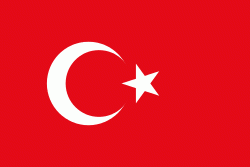Giresun Province (Giresun)
The provincial capital is Giresun.
Giresun is an agricultural region and its lower areas, near the Black Sea coast. It is Turkey's second largest producer of hazelnuts and it is famously home to the best quality hazelnuts in the world; a Giresun folk song tells "I will not eat a single hazelnut, unless you are by my side," while another tells of a lover shot dead under a hazelnut tree. Forests and pasture cover the high mountainous regions, and in places there is mining of copper, zinc, iron and other metals. The mountain villages are remote, with poor roads and little else in the way of infrastructure. The hillsides are too steep for most forms of agriculture, and as a result, cornbread is the traditional meal, as wheat cannot be grown.
The climate is typical of this stretch of the Black Sea coast, i.e. very wet. Local flora includes bilberries (Turkish "taflan").
Map - Giresun Province (Giresun)
Map
Country - Turkey
 |
|
| Flag of Turkey | |
One of the world's earliest permanently settled regions, present-day Turkey was home to important Neolithic sites like Göbekli Tepe, and was inhabited by ancient civilisations including the Hattians, Hittites, Anatolian peoples, Mycenaean Greeks, Persians and others. Following the conquests of Alexander the Great which started the Hellenistic period, most of the ancient regions in modern Turkey were culturally Hellenised, which continued during the Byzantine era. The Seljuk Turks began migrating in the 11th century, and the Sultanate of Rum ruled Anatolia until the Mongol invasion in 1243, when it disintegrated into small Turkish principalities. Beginning in the late 13th century, the Ottomans united the principalities and conquered the Balkans, and the Turkification of Anatolia increased during the Ottoman period. After Mehmed II conquered Constantinople (Istanbul) in 1453, Ottoman expansion continued under Selim I. During the reign of Suleiman the Magnificent, the Ottoman Empire became a global power. From the late 18th century onwards, the empire's power declined with a gradual loss of territories. Mahmud II started a period of modernisation in the early 19th century. The Young Turk Revolution of 1908 restricted the authority of the Sultan and restored the Ottoman Parliament after a 30-year suspension, ushering the empire into a multi-party period. The 1913 coup d'état put the country under the control of the Three Pashas, who facilitated the Empire's entry into World War I as part of the Central Powers in 1914. During the war, the Ottoman government committed genocides against its Armenian, Greek and Assyrian subjects. After its defeat in the war, the Ottoman Empire was partitioned.
Currency / Language
| ISO | Currency | Symbol | Significant figures |
|---|---|---|---|
| TRY | Turkish lira | ₺ | 2 |
| ISO | Language |
|---|---|
| AV | Avar language |
| AZ | Azerbaijani language |
| KU | Kurdish language |
| TR | Turkish language |
















